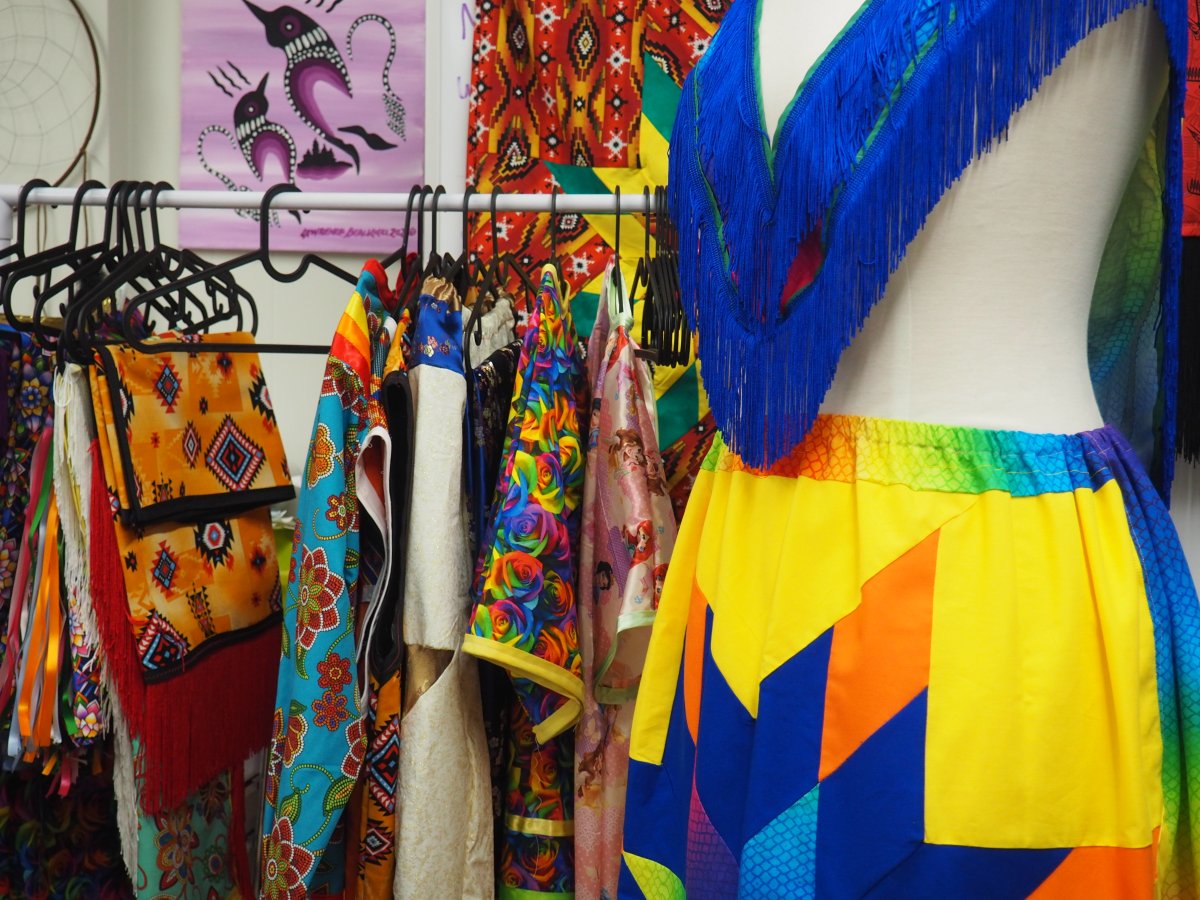Looking for more Indigenous news? Find our stories here.

Powwow regalia is expensive. A handmade jingle dress, grass dance outfit or fancy shawl can run you hundreds — if not thousands — of dollars, making this aspect of culture difficult for many to connect with or force most to break the bank.
It’s a gap the Vancouver Aboriginal Health Society (VAHS) saw and knew it needed to address ahead of its first annual Honouring our Fathers, Grandfathers and Sons powwow.
“We have a lot of families that were interested in dancing and making regalia but the cost of living is just so expensive that it’s not in their price range,” said Rosemary Stager-Wallace, executive director of VAHS. “We really wanted to give people low-barrier access to their culture.”
With at least 60 regalia’s already made, dozens of people have been flooding 449 E Hastings St. every Monday and Thursday for the past several months to learn about regalia, how to use a sewing machine and where ribbons and beadwork should be placed. VAHS applied for grants, hired instructors and aimed their programming towards powwow prep to ensure everyone would be ready.
“The response has been really amazing, we’ve had so much engagement with the community, (they’re) so happy to be able to do this and we’ve made regalia from little kids to elders,” said Stager-Wallace. “Britannia has been having powwow nights every Wednesday so people have been able to learn how to dance in a culturally safe space and then with us providing the material and the instructors, it’s just really given a lot of people that opportunity that they wouldn’t have had before.”
“They’re really excited about being able to finally make a regalia and dance.”
Powwows are gatherings where people dance, compete, play music, sell beadwork and come together. They can be small and intimate, made just for the nation, or large and wide-reaching with people travelling from across the province, country or even North America.
They’re an important expression of culture, foster community and pride and are an illustration of resistance.
“For about 75 years powwows were illegal in Canada. We weren’t allowed to powwow or potlatch or celebrate our culture or even practice our culture,” said Stager-Wallace.
“A lot of the teachings got lost along the way … people are (now) embracing their culture and there’s more opportunity to learn.”
“It’s just so important for Indigenous people to have that identity, knowing who you are, that you are a part of something and just connecting with your ancestral knowledge and where you come from, your values. It makes a big difference in your life.”
One of the VAHS instructors, Chantel Dustyhorn, has been involved in powwows since she was a little girl. She’s been sewing and beading for herself since she was seven and started designing for others at 16.
“It’s so amazing that I’m able to share the knowledge and the protocols,” she said. “With the expenses for material, for thread, needles and machines … to share that and help them out is an amazing opportunity.”
“We’re able to create head-to-toe regalia for people to come out and dance and be part of the powwows that are coming up.”
Dustyhorn said it’s been great to have a place for community members to come and learn and can’t wait to see everyone in their regalia once it’s all finished.
“It is so amazing to be a Native person and to share (my culture) and for people to come and to be appreciative, that’s a blessing.”
Bambi Smith is making a grass dance outfit for her grandson. It’s the first time she’s used a sewing machine to make regalia; she used to make everything by hand.
Smith’s grandson is nine and has been dancing for six years, this is the first time she’s making regalia for him.
“He’s very excited, the fire colors is something he’s been attracted to since he was a young boy,” said Smith. “And I’ve been looking for somebody to make the fire colours for quite some time and I decided it’s best that I do it myself.”
Smith is Coast Salish but her grandson is part Mohawk, so it’s important for her to help keep their tradition and culture alive.
“Teaching the children at a young age to dance and to sing and to look after your spirit is something really important to me,” she said.
“There are a lot of people waiting to see him because he’s a really good dancer, I just want to see how alive he comes when he has (regalia) on. There’s going to be something really special for me to see that my hands went into this regalia.”

The powwow is taking place this weekend at the Britannia Community Centre soccer field in Vancouver.
Stager-Wallace said she’s excited to bring culture to the community and really celebrate being Indigenous.
“We wanted to have it on Father’s Day to honor our fathers, grandfathers and sons,” she said. “Colonialism has … had a lot of negative impacts and we really just want to start rebuilding our family systems and start honoring our roles in the family.”
“It is not too often that the Indigenous community that the fathers are actually hosted and looked after in a way that with respect,” adds talalsámkin siyám (Chief Bill Williams). “It is very important to celebrate our men because today there are very few reconciliation programs that focus on healing the men. And this is an opportunity to showcase that the men also need healing, too.”
Stager-Wallace said this weekend will see two host drums, Young Spirit and Blackstone as well as a Coming Out Dance, Tiny Tots and at least 50 artisan and food vendors.
“I think with events like this, positive events like powwow, participating in powwow dancing, doing the work on your regalia,” said Stager-Wallace, “these are ways to help us get stronger for our children and future generations.”







Comments